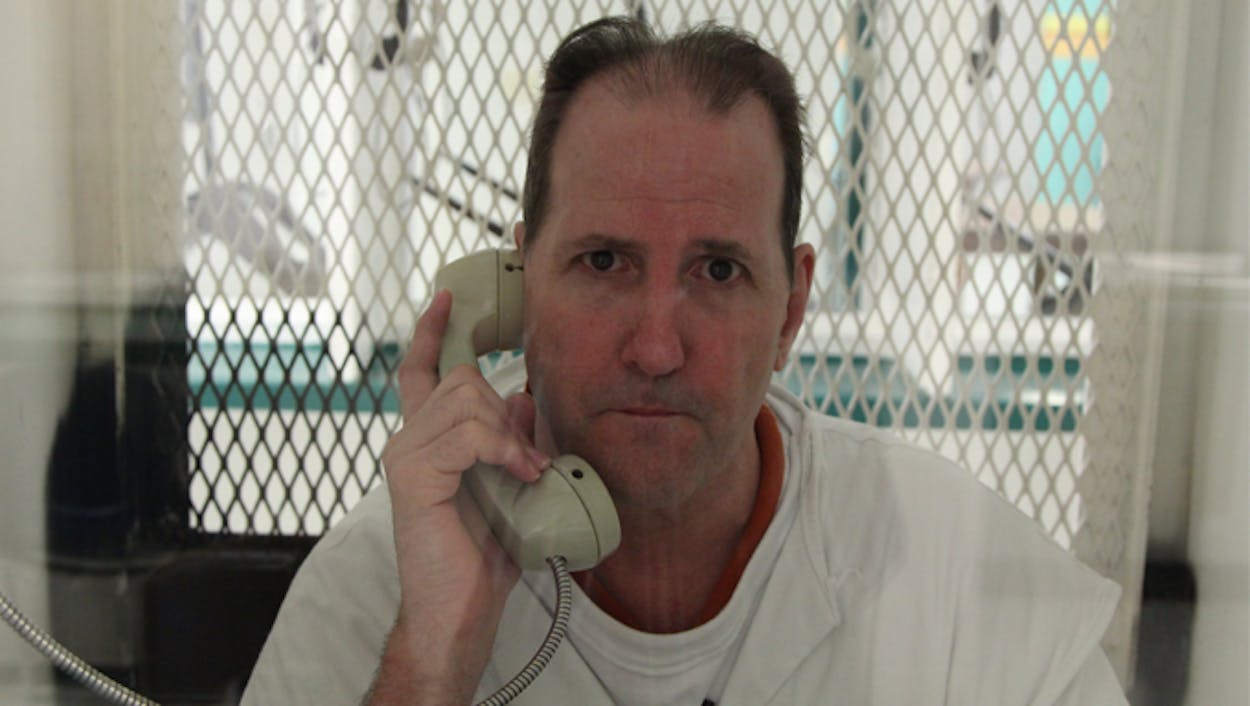Max Soffar, one of the longest-serving inmates on Texas’s death row, died Sunday evening at the Polunsky Unit’s infirmary. The sixty-year-old, who had been convicted of a triple murder in a Houston bowling alley in 1980, had been suffering from liver cancer since 2013. According to his lawyer, Andrew Horne, Soffar collapsed in his cell in February and was taken to the death row hospice unit. “He was in terrible pain and had become very weak, with a lot of internal bleeding,” Horne said. Soffar spent his final two months in the infirmary. Soffar’s wife, Anita, had visited earlier on Sunday, and not long after she left, he died.
Soffar was one of the true question marks on death row, a man convicted without a shred of physical evidence to tie him to the crime: no fingerprints, no blood, no hair, no DNA, no gun, and no witnesses. In 2014, I wrote a plea to Governor Rick Perry to consider clemency to the terminally ill Soffar. As I said then:
Only one thing connected Max to the murders, and that was his confession, though it was at odds with almost every crime-scene fact. Two different juries—in 1981 and 2006—believed that a man wouldn’t confess to something he didn’t do, and they sent him to death. Over the years, though, plenty of people have come to believe he got a raw deal, from dozens of lawyers willing to work for Max pro bono to five different federal and state judges. One is a conservative federal judge named Harold DeMoss, who wrote in 2002, ‘I have laid awake nights agonizing over the enigmas, contradictions, and ambiguities’ in Max’s case.
Another judge disturbed by the case was Cathy Cochran of the Texas Court of Criminal Appeals, who wrote, “I find this case quite troubling. There is something very wrong about this case.’”
Indeed, Soffar’s story is a textbook example of how to get someone to confess to something he didn’t do. “Everything in those statements that I made does not match the crime scene,” he told me in that 2014 interview. “It’s all made up off the top of my head.” Soffar was questioned for hours by HPD detectives.
When they started losing interest in my story, I started confessing to murders and robberies and kidnappings. I had been stringing them along—we went to all these businesses, all these dig sites looking for dead bodies, only thing they found was a bunch of sun and a bunch of bugs, no dead bodies. We go the stores I confessed to robbing, never been robbed. They come out—‘All right, I told you, no more games.’ I’m doing everything I can to keep them interested. Finally, they just came in the room and started saying, ‘Well, this is the way it happened, isn’t it? This is the way it happened. This is a lie, isn’t it?’ And this is how the confessions were formed.
Soffar figured that eventually the police would figure it out and would stop the interrogation.
Somebody’s gonna come in the room and they’re gonna say, ‘All right, you’re a liar—we don’t believe you, this never happened.’ But they weren’t about to do that. They kept, for three days, on and on and on and on, interrogating me. ‘Tell us this, tell us this, this is a lie, isn’t it?’ So I would know when they kept saying that over and over, ‘this is a lie,’ take that out of there. They’d take it out, bring in another statement, bring in the stenographer, and come in there and redo the whole thing over, then they would make me initial where they had misspelled a word or whatever. I mean, it was total chaos.
The chaos continued for the next 35 years, with no letup and no help, even as Soffar was given an entirely different kind of death sentence: liver cancer. Governor Perry ignored all pleas for clemency (the ACLU and change.org got 115,000 people to sign a petition asking Perry to grant it), as did the Board of Pardons and Paroles, which turned down a petition to commute Soffar’s death sentence to life, which would have allowed him to be released for time served and go home and die with his family. The federal U.S. District Court turned down a final writ of habeas corpus filed by his attorney a couple of months later, in December 2014.
However, Soffar received some welcome good news recently when the conservative Fifth Circuit Court of Appeals granted him permission to appeal the federal court decision. The court, noting the inmate’s failing health, even set up oral arguments, which were to take place this Wednesday. “Max was very excited about the Fifth Circuit ruling,” says Horne, “very optimistic.”
The attorney, who worked on Soffar’s case for nine years and grew close to the inmate, says, “I’m glad he’s not suffering anymore, but I’m frustrated that he didn’t get his rights vindicated.” And he says Soffar never backed down. “He protested his innocence to the last.”








